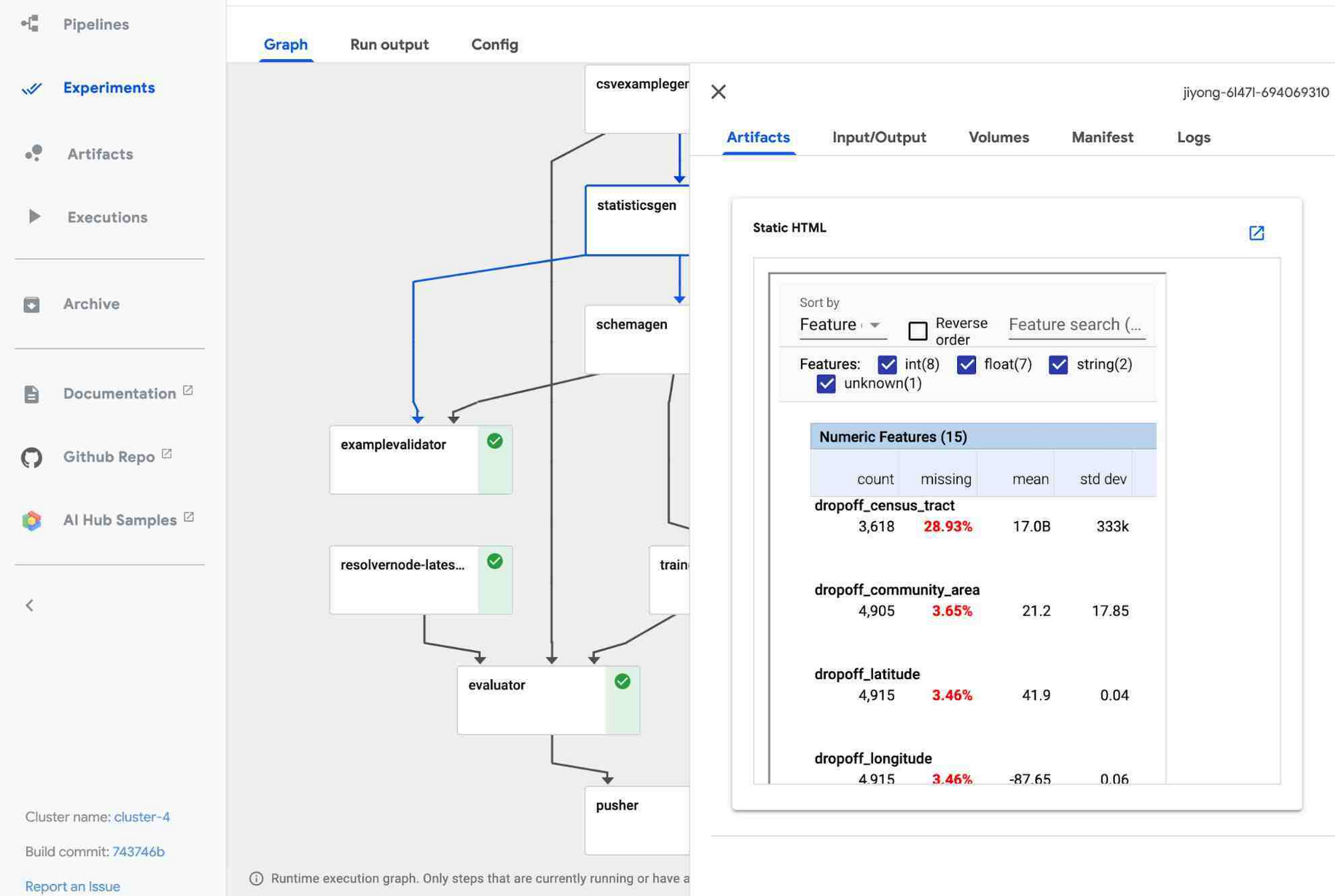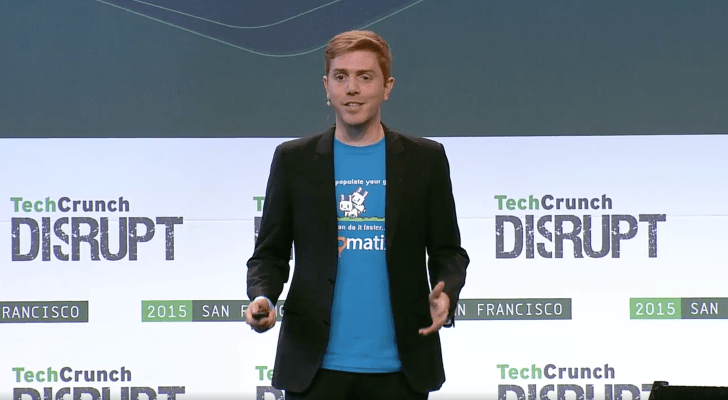Music
Trailers
DailyVideos
India
Pakistan
Afghanistan
Bangladesh
Srilanka
Nepal
Thailand
Iraq
Iran
Russia
Brazil
StockMarket
Business
CryptoCurrency
Technology
Startup
Trending Videos
Coupons
Football
Search
Download App in Playstore
Download App
Best Collections
Technology
Google Cloud today announced the beta launch of Cloud AI Platform Pipelines, a new enterprise-grade service that is meant to give developers a single tool to deploy their machine learning pipelines, together with tools for monitoring and auditing them.
&When you&re just prototyping a machine learning (ML) model in a notebook, it can seem fairly straightforward,& Google notes in todayannouncement. &But when you need to start paying attention to the other pieces required to make an ML workflow sustainable and scalable, things become more complex.& And as complexity grows, building a repeatable and auditable process becomes harder.

That, of course, is where Pipelines comes in. It gives developers the ability to build these repeatable processes. As Google notes, there are two parts to the service: the infrastructure for deploying and running those workflows, and the tools for building and debugging the pipelines. The service automates processes like setting up Kubernetes Engine clusters and storage, as well as manually configuring Kubeflow Pipelines. It also uses TensorFlow Extended for building TensorFlow-based workflows and the Argo workflow engine for running the pipelines.
In addition to the infrastructure services, you also get visual tools for building the pipelines, versioning, artifact tracking and more.
With all of this, getting started only takes a few clicks, Google promises, though actually configuring the pipelines isn&t exactly trivial, of course. Google Cloud is adding a bit of complexity (or flexibility, depending on your perspective) here, given that you can use both the Kubeflow Pipelines SDK and the TensorFlow Extended SDK for authoring pipelines.

- Details
- Category: Technology Today
Read more: Google Cloud launches new tools for deploying ML pipelines
Write comment (92 Comments)
On Wednesday, U.S. Chief Technology Officer Michael Kratsios convened representatives from a number of the techbiggest companies to gameplan a response to the worsening global coronavirus pandemic.
According to The Washington Post, the meeting, held remotely over the phone and through video calls, served as a brainstorming session for tech and the White House on coordinating against coronavirus misinformation, potentially aiding in the analysis of relevant new medical research and how to lend techresources to support the federal government to track travelers and other complex data-driven tasks.
As Politico and the Post reported, the White House is seeking help from Google, Facebook, Amazon, Microsoft, Apple, IBM, Cisco and Twitter on the efforts.
Major tech companies have been proactive in protecting their own workforces from the coronavirus epidemic, even as a federal response lags. On Tuesday, Google asked all North American employees to work from home, expanding its previous guidance for Washington state-based workers. That same day, Mark Zuckerberg announced that the Chan Zuckerberg Initiative would work with Bay Area health research teams to quadruple the coronavirus testing capacity in the area.
In a statement following the virtual meeting, Kratsios described the coronavirus response as an &all-hands-on-deck effort.&
- Details
- Category: Technology Today
Read more: White House asks tech leaders for help with coronavirus response
Write comment (93 Comments)
Software giant Salesforce announced this week the addition of a few new tools in healthcare management to the Salesforce Health Cloud, with the goal being to help payers and providers utilize a more comprehensive system.
The first is a healthcare provider management feature allowing doctors and other healthcare workers a way to efficiently manage new accounts and activities from a single point.
Also included in the update is Einstein Analytics for Healthcare, which will provide pre-built dashboards and industry KPIto help referral managers keep track of their performance.
Destinations, the third addition from Salesforce, is a no-code healthcare interoperability solution available in SalesforceAppExchange program and provided in partnership with Bridge Connectors. Destinations allows healthcare organizations to integrate internal data with SalesforceHealth Cloud without the need to write any code.
Several large healthcare organizations rely on SalesforceHealth Cloud for provider services, including Cancer Treatment Centers of America, which serves cancer patients at treatment centers and hospitals throughout the U.S., and Piedmont Healthcare, which has 11 hospitals and serves in over 250 locations, according to its website. The ability to manage accounts, track analytics over time and integrate that data provides a way for these facilities to more efficiently do their work and treat patients in need in a more organized manner.
&All of this is part of SalesforceCustomer 360 for Healthcare vision to empower healthcare and life sciences organizations of all sizes and types across provider, payer, pharmaceutical, and medical device companies to deliver connected, collaborative and personalized care and experiences,& notes a Salesforce release on the announcement. &With these new innovations, we&re working towards improving health outcomes and unlocking operational efficiencies by connecting people, data, and processes on a unified platform.&
- Details
- Category: Technology Today
Read more: Salesforce adds new healthcare provider relationship management and analytics tools
Write comment (93 Comments)YouNeedABudget (or YNAB, as itknown) started as a spreadsheet built by a college student who was looking to cover his rent.
A decade and a half later, it has grown into a full-fledged budgeting tool with apps across a number of platforms, a deeply devoted user base and hundreds of employees — all operating 100% remotely.
I spoke to YNAB co-founder Jesse Mecham about how it all works; why they&re remote, how they bring everyone together (both virtually and in the real world) and the pros and cons of being spread across the globe.
Herethe transcript of our chat, lightly edited for brevity and clarity.

TechCrunch: Letset the scene a little bit. It2004, you&re starting what would eventually become YNAB. Why?
Jesse Mecham: I needed to make rent. Thatthe honest truth.
We were going to have a baby, and my wife was going to stop working so she could do the mom thing full-time. I was trying to figure out how I could not borrow money and not stop going to school, and I figured I could sell this little spreadsheet I had built. That was back before, you know, phone apps and all that — so I just got started on that, selling a little spreadsheet to make some side money to get us through school without having to borrow any.
When it was time to grow, what made you hire remote?
- Details
- Category: Technology Today
Read more: YouNeedABudget creator Jesse Mecham on handling a remote 115-person team
Write comment (99 Comments)
Unity has acquired AI game developer tools startup Artomatix.
The Dublin startup builds developer tools that allow game studios to more easily create deep learning-enhanced textures that scale more convincingly.
Developers can use the startupArtEngine platform to bring real-world materials to their game worlds, adapting the visual patterns to their 3D worlds more quickly than existing toolsets while eliminating seams and irregularities. ArtEngine uses AI to identify visual flaws in replications and saves developers from having to endlessly tweak environments.
The company launched at TechCrunch Disrupt SF back in 2015. Artomatix went on to raise just over $12 million in grants and funding from VCs, including from Enterprise Ireland, Suir Valley Ventures, Manifold Partners and Boost Heroes.
Artomatix team will continue to operate out of their Dublin offices. Unity did not share an acquisition price.
Unity, which boasts that more than half of new games are built using its engine, is an obvious suitor for Artomatixtechnology. The engine has continued to grow more powerful in recent years, but bulking up in capabilities has increased complexity and left developers with lengthy render times.
If Artomatixtechnology can help game designers create the art used to populate digital environments, Unity can begin to push more workflow through AI-assisted tools and save developers time.
- Details
- Category: Technology Today
Read more: Unity acquires Dublin-based deep learning startup Artomatix
Write comment (94 Comments)YouTube today announced a change in policy regarding the novel coronavirus, or COVID-19. Previously, YouTubeadvertising guidelines prevented monetization of videos that included more than a passing mention of the coronavirus as part of its &sensitive events& policy. The policy is meant to protect advertisers from being associated with videos about things like mass shootings, terrorist acts, armed conflicts and global health crises — like the coronavirus. Now, YouTube is changing this policy to allow some creators to monetize videos on the topic, it says.
The creator community was unhappy with YouTubedecision to demonetize any video featuring discussions of the coronavirus. (Though, to be fair, YouTube creators are generally unhappy when YouTube demonetizes any of their videos.)
But by not allowing creators to profit from videos about the coronavirus, or COVID-19, YouTube was putting a damper on informative, newsworthy videos as well as those capitalizing on the human tragedy and peoplefears about the emerging pandemic. The ban on monetization also meant that news organizations covering the topic responsibly wouldn&t be able to generate revenue from their videos, even as coronavirus news became one of their main coverage areas.
Today, YouTube CEO Susan Wojcicki explained the companydecision to re-open monetization on videos referencing the health crisis.
She says that the sensitive events policy was designed to apply to short-term events of a significant magnitude, like a natural disaster.
&Itbecoming clear this issue is now an ongoing and important part of everyday conversation,& Wojcicki said, in reference to the coronavirus, &And we want to make sure news organizations and creators can continue producing quality videos in a sustainable way,& she added.
Not all video creators will be eligible to monetize their coronavirus videos, she notes.
Instead, YouTube says ads will be enabled on &a limited number of channels,& including those belonging to news partners and creators &who accurately self-certify.& The latter is a more questionable choice, as it opens up monetization to any creator using YouTubeself-labeling system, not just news organizations or trusted health authorities.
The Self Certification system is one where creators use an online dashboard to tell YouTube whether or not their videos comply with advertiser guidelines ahead of YouTubeautomated review of their content. Over time, YouTube will rely on creators& input instead of its own systems if the creators have a history of accurate self-certifications. Itan honor system, essentially, followed by an official check.
The system doesn&t prevent creators from publishing misinformation in their videos, then labeling the video as advertiser-friendly. In addition, many creators believe that the bogus information they&re sharing is correct and true, so a self-certification system wouldn&t stop them from publishing their misleading and often dangerous advice. Already, YouTube has to work to quickly remove videos like that. This includes videos discouraging people from seeking medical treatment or making dangerous claims — like how garlic or bleach can prevent the viral disease, for example.
To fight misinformation, YouTube is also raising authoritative sources in its search results and recommendations and is showing information panels on which videos are flagged.
Despite these efforts, there continues to be a massive amount of misinformation circulating across social media, including on sites like Facebook and Twitter, in addition to YouTube. WHO Director-General Dr. Tedros Adhanom Ghebreyesus even referred to the crisis as not just an epidemic, but &an infodemic.& (WHO today has upgraded the COVID-19 viral disease to a pandemic, as well.)
In light of the misinformation problem, YouTubedecision to open up monetization on videos about the coronavirus will be a controversial choice. In doing so, it signals to the creator community that one of the most-searched topics on the internet can now be leveraged for views and ad dollars. That invites exploitation.
- Details
- Category: Technology Today
Read more: YouTube will now allow creators to monetize videos about coronavirus and COVID-19
Write comment (93 Comments)Page 1270 of 1446

 12
12





